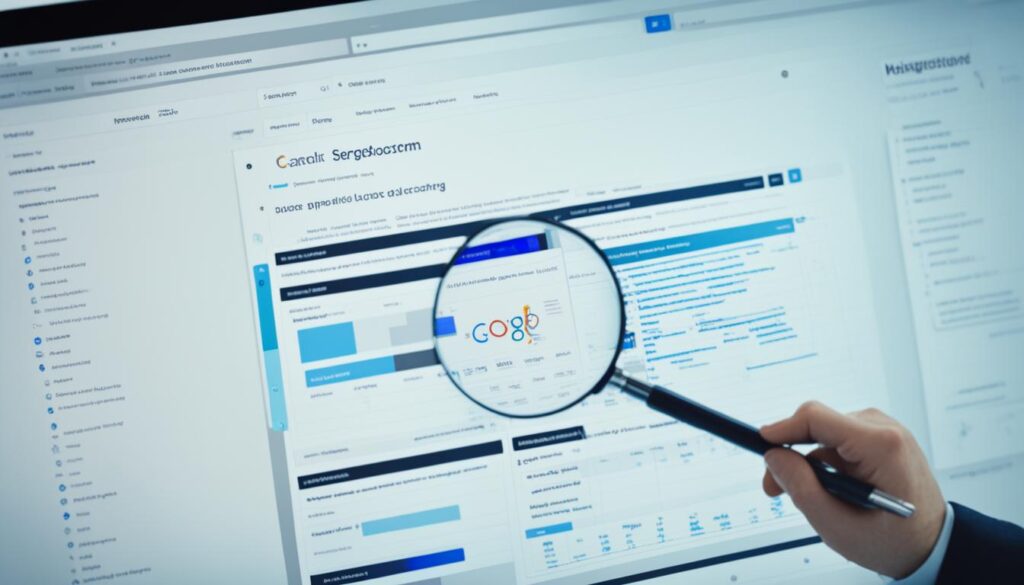
Did you know 20 Forbes Business Council members shared valuable SEO advice? This advice can help business leaders like you boost their online visibility. One member saw their website traffic jump from 50,000 to millions in weeks. The key was using smart search engine optimization (SEO) techniques.
In today’s digital world, standing out is tough. A strong SEO strategy is key for businesses of all sizes. By using SEO, you can improve your online presence, bring in more targeted traffic, and beat your competitors in search results. This guide will share expert tips and strategies to increase your website’s visibility and reach.
Key Takeaways:
- Prioritize quality content creation to improve your SEO efforts
- Leverage optimization techniques, keywords, and powerful SEO tools
- Enhance user experience and create mobile-friendly websites
- Increase media presence and build credibility through industry involvement
- Maintain consistency to sustain your SEO rankings and visibility
Unraveling the Power of SEO

In today’s digital world, search engine optimization (SEO) is key for online success. It makes your website more visible on search engines. By using smart SEO strategies, you can boost organic traffic, build credibility, and save money on marketing.
What is SEO?
SEO improves your website’s search engine ranking. It combines on-page, off-page, and technical efforts. The aim is to make your site more attractive to search engines. This leads to better rankings and more organic traffic.
Why is SEO crucial for your website?
Search engines like Google and Bing are where people find what they need online. With good search engine optimization, you can:
- Get more visibility and reach more people
- Attract organic traffic, which is often more valuable
- Build credibility in your field
- Use a cost-effective marketing strategy
SEO is a strong tool for reaching your audience, boosting your site’s performance, and meeting your business goals.
“63% of organic search clicks go to the first five results on Google, highlighting the importance of ranking higher in search results to increase visibility.”
Keyword Research: The Foundation of SEO

Keyword research is key to a strong SEO strategy. These are the words and phrases people use when looking for info, products, or services online. By using these keywords in your website’s content and structure, you can increase your online visibility. This helps you reach people who are actively looking for what you offer.
Identify Relevant Keywords
Begin by making a list of terms and phrases linked to your business or services. Use tools like Google Keyword Planner, SEMrush, and Ahrefs to find more keywords. These tools show search volumes and competition levels.
Focus on the search intent of your users. Are they looking for info, directions, to investigate, or to buy something? Choosing keywords that match their intent helps you make content they’ll find useful.
Incorporate Keywords Naturally
After picking your keywords, optimize your website’s content. Add these keywords to headings, subheadings, and body text. Make sure not to stuff your content with keywords, as it can hurt your rankings.
Always put quality content first. Create engaging, informative content that focuses on your audience’s needs. Include your keywords naturally to improve your search engine ranking and give a better experience to your visitors.
| Keyword Research Tool | Key Features |
|---|---|
| Google Keyword Planner | Provides search volume data, keyword suggestions, and cost-per-click (CPC) estimates for Google Ads campaigns. |
| SEMrush | Offers comprehensive keyword research, competitor analysis, and on-page SEO optimization recommendations. |
| Ahrefs | Analyzes backlink profiles, keyword rankings, and content gap opportunities to identify high-potential keywords. |
“Keyword research is the foundation of any successful SEO strategy. By understanding the terms your target audience uses to search, you can create content that aligns with their needs and improves your website’s visibility in search results.”
Content Optimization: The Key to Engaging Your Audience

In the digital marketing world, content is key to a successful SEO strategy. To grab your audience’s attention and boost your online presence, make sure your content meets their needs and interests. This means creating content that matches search engine algorithms and what users are looking for.
Create High-Quality, Valuable Content
Writing engaging and informative content is vital for connecting with your audience and showing your brand’s expertise. Aim to make blog posts, articles, and thorough product descriptions, offer real value, and include the right keywords. Make sure your content is clear and easy to read with short paragraphs, headings, and lists.
Optimize for User Intent
Knowing what your audience wants to find is key to content optimization. Look at the keywords your target customers use and create content that answers their questions and solves their problems. Search engines favor sites that give users a good experience, so content optimization is vital for SEO success.
| Content Optimization Best Practices | Benefits |
|---|---|
| Conduct thorough keyword research to find valuable, less competitive terms | Better search rankings and more organic traffic |
| Optimize metadata, like title tags and meta descriptions, to get more clicks | More visibility and engagement from search engine users |
| Use multimedia like images, videos, and infographics to make content more engaging | Better user experience and stronger performance in search engine algorithms |
| Keep updating and refreshing content to stay relevant and improve rankings | Continued growth in organic traffic and better search engine performance |
By focusing on making content that’s high-quality and centered on users, and optimizing it for search engine algorithms and user intent, you can increase your online visibility. This leads to more organic traffic and helps establish your brand as a trusted authority in your field.
On-Page SEO: Enhancing Your Website’s Structure

Improving your website’s visibility and relevance in search engines is key. This means making sure elements like title tags, meta descriptions, headers, images, and URLs are optimized. A well-structured website with easy navigation and clear menus makes for a better user experience.
Optimize Title Tags and Meta Descriptions
Title tags and meta descriptions are what users see first in search results. Make sure they’re between 50-60 characters long. Write them in a way that reflects your page’s content and includes your target keywords naturally.
Improve Site Navigation and User Experience
Improving your website’s structure and user experience is crucial. Make sure your site is easy to navigate. Use internal linking to help search engines understand your site better. Also, make sure your site works well on mobile devices and loads fast for a smooth experience.
By focusing on these areas, you’ll not only please your visitors but also improve your search engine rankings. This means more people will find your website.
“Effective on-page optimization is the foundation of a successful SEO strategy. It’s where you lay the groundwork for your website to thrive in search engine results.”
Link Building: The Vote of Confidence
Link building is key in SEO, boosting your site’s visibility online. Backlinks are like “votes of confidence” from other sites. They tell search engines like Google that your content is valuable and trustworthy. Getting authoritative backlinks can improve your site’s domain authority and search rankings.
Search engines now focus more on link quality. They filter out low-quality links. So, getting relevant, high-quality links is vital for better rankings and more traffic. But, beware of over-optimizing, as Google can penalize sites that use manipulative link-building.
Focus on building real relationships with sites in your industry. Earn backlinks through valuable content. Guest blogging, fixing broken links, and working with influencers can help get you authoritative backlinks. These backlinks boost your site’s credibility and visibility.
| Link Building Strategies | Benefits |
|---|---|
| Guest Blogging | Gain visibility, build relationships, and earn high-quality backlinks |
| Broken Link Building | Identify and replace broken links on relevant, high-authority websites |
| Influencer Collaborations | Leverage the credibility and audience of industry influencers |
| Original Research and Case Studies | Attract valuable backlinks by offering unique insights and data |
Quality should always come before quantity in link building. Build relationships with trusted sources and create content that others will want to share. This approach will help you build a strong link profile for long-term SEO success.
Mobile Optimization: Embracing the Mobile-First World
In today’s world, mobile devices rule the internet. Mobile optimization is key for a smooth user experience and boosts search engine algorithms.
Over 65% of searches come from mobile devices. So, your website must be responsive and fast on phones and tablets. Google now favors websites that focus on mobile users.
Keep up with the trend by designing with a mobile-first approach. Use a layout that changes size with the screen, with fluid grids and percentages. This makes your site look good and helps with search engine visibility.
Speed matters too. If your site takes too long to load, over 50% of users will leave. Use code optimization, image compression, and content networks to make your site faster.
By focusing on mobile optimization, you give users a great user experience. You also tell search engines your site is easy to use and relevant. This can lead to better rankings and more visibility online.
“Responsive design is no longer a luxury, but a necessity in the mobile-first world.”
- Implement a responsive web design that adapts seamlessly to various screen sizes.
- Optimize your website’s performance to ensure fast load times, as over 50% of users will abandon a site if it takes longer than three seconds to load.
- Leverage structured data (Schema) to enhance your website’s search engine visibility and mobile-first indexing.
- Continuously monitor and improve your website’s mobile-friendliness to stay ahead of the curve.
Putting mobile optimization first means a better user experience and a stronger online presence. This leads to more visibility, engagement, and conversions.
SEO
In the fast-paced digital marketing world, search engine optimization (SEO) is key to boosting your online presence and bringing more visitors to your site. SEO is a vital part of your digital marketing plan. It works best when combined with other strategies like content marketing, social media, and search engine marketing.
Using a complete approach helps you build a strong online presence that draws in and keeps your target audience’s attention. This way, you can make the most of your marketing efforts and see better results for your business.
Organic search is a huge source of website traffic, bringing in 53% of all visitors. The SEO market is also expected to grow to USD 122.11 billion by 2028. This shows how important SEO is in the digital world.
To make the most of SEO, blend it with other digital marketing tactics. By linking your content marketing, social media, and search engine marketing efforts, you can build a strong and effective online presence. This will help you connect with your audience and get the results you want.
“Focus exclusively on presenting this statistical information, avoiding the inclusion of personal opinions, interpretations, or any other comments not directly related to the statistics.”
Success comes from finding the right balance between SEO and other digital marketing strategies. By taking this approach, you can increase your online visibility, engage with your audience, and reach your business goals.
Technical SEO: Under the Hood Optimization
Improving your website’s technical parts is key to making it more visible and perform better in search engines. This means making your site faster, easier for search engines to crawl, and keeping it well-indexed. These are the main parts of technical SEO.
Website Speed and Performance
In today’s fast digital world, how fast your website loads is very important. Most people expect mobile pages to load in 1-2 seconds. If it doesn’t, they might leave right away, missing out on what you offer.
Improving your site’s speed can be done by using caching, reducing code size, and making images smaller. This makes your site faster and gives users a better experience. Search engines see this as a sign that your site is well-made and valuable. This can lead to better rankings and more visitors.
Ensure Crawlability and Indexability
Search engines need to be able to crawl and index your site to find it. A clear site structure, breadcrumb navigation, and an XML sitemap help search engines do this better.
- A simple site structure means any page is easy to find, improving crawlability.
- Breadcrumb navigation helps users see where they are on the site, making it easier for them.
- An XML sitemap gives a detailed look at your site, making sure search engines don’t miss important pages.
Using robots.txt and canonical tags correctly also helps search engines understand your site. They tell search engines about your site’s structure and which content is the main version.
By focusing on the technical parts of your website, you can make it more visible to search engines. This leads to more visitors and better results for your business.
Local SEO: Reaching Your Neighborhood
In today’s digital world, local SEO is key for businesses wanting to connect with people in a specific area. By making your online presence local-friendly, you can get more visible, draw in more customers, and grow your business.
Optimize for Local Searches
To show up in local search results, use location-based keywords on your website and online listings. Include your city, neighborhood, or nearby landmarks. This helps match your content with how people in your area search for things.
Leverage Online Business Directories
Claiming and keeping accurate listings on sites like Google My Business boosts your local SEO and reach. These sites let you share info about your business, like your address, hours, and reviews. Stay updated and interact with your community to improve your local search optimization and gain trust with potential customers.
Local SEO is an ongoing task. Keep working on making your online presence better and connecting with your local audience. This way, you can fully benefit from local search optimization and grow your online business sustainably.
“Local SEO is the key to unlocking the full potential of your business in your community. By optimizing for local searches and leveraging online business directories, you can connect with your target audience and drive increased foot traffic to your physical location.”
Tracking and Monitoring: The Key to Continuous Improvement
Use website analytics to boost your SEO success. Analyzing your site’s performance helps you make smart decisions. It shows you how to improve your online presence. Tracking keywords and user engagement is key to optimizing your SEO.
Analyze Website Analytics
Explore your website analytics to understand your audience and SEO strategy impact. Look at organic traffic, bounce rate, and conversion rates. This data shows how well your content and user experience work. Use it to improve and get better results.
Monitor Keyword Rankings
Watch your keyword rankings to keep your site visible online. Use tools like Google Search Console and Moz’s Rank Tracker. They show where your site ranks for target keywords. This helps you see if your keyword strategy works and adjust it as needed.
| Metric | Importance | Measurement Tool |
|---|---|---|
| Organic Traffic | Evaluate the performance of your SEO strategy in driving unpaid, search-based visitors to your website. | Google Analytics |
| Bounce Rate | Understand user engagement and the effectiveness of your website’s content and design in retaining visitors. | Google Analytics |
| Conversion Rate | Measure the success of your SEO efforts in driving desired actions, such as form submissions or purchases, from organic traffic. | Google Analytics |
| Keyword Ranking | Assess your website’s visibility in search engine results for your target keywords, which directly impacts organic traffic and visibility. | Google Search Console, Moz Rank Tracker |
| Backlink Profile | Analyze the quality and quantity of inbound links to your website, as they play a crucial role in search engine rankings. | Ahrefs, Moz Link Explorer |
Keep an eye on these key indicators to make smart SEO decisions. This approach helps improve your site’s search engine visibility and user engagement. It’s the key to ongoing improvement and SEO success.
Conclusion
In today’s digital world, SEO strategy is key for success in online visibility and digital marketing. This guide has given you expert tips to boost your website’s visibility and beat your competitors in search results. Always be ready to change your SEO strategy as search engines and user habits change.
Using a detailed, data-based SEO approach can make your website a magnet for your target audience. This leads to real results for your business. Keep focusing on continuous improvement, and your online presence will keep growing.
The path to top online visibility might seem tough, but by following this guide’s strategies, you’re on the right track. Embrace SEO, and see your business reach new heights in the changing internet world.
Use web analytics to see how your SEO is doing. Keep an eye on rankings, user behavior, and content performance. This helps you refine your strategy for better results.


